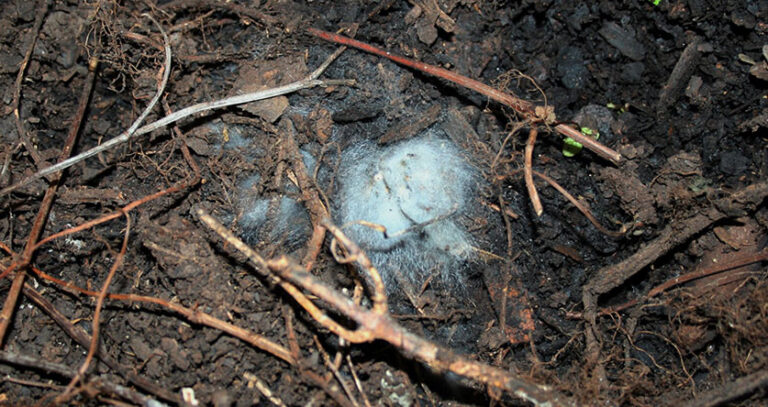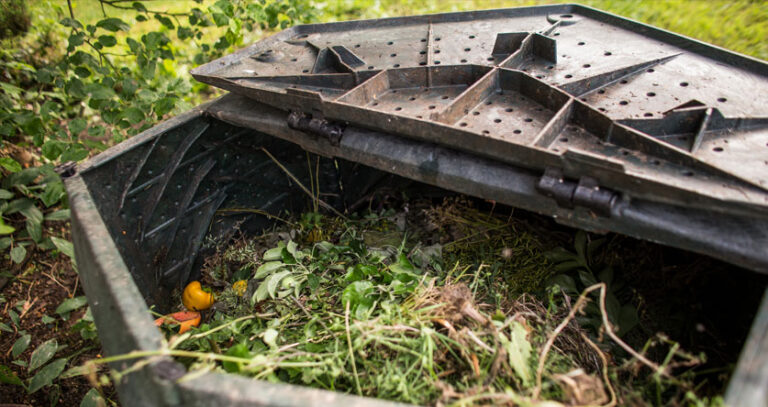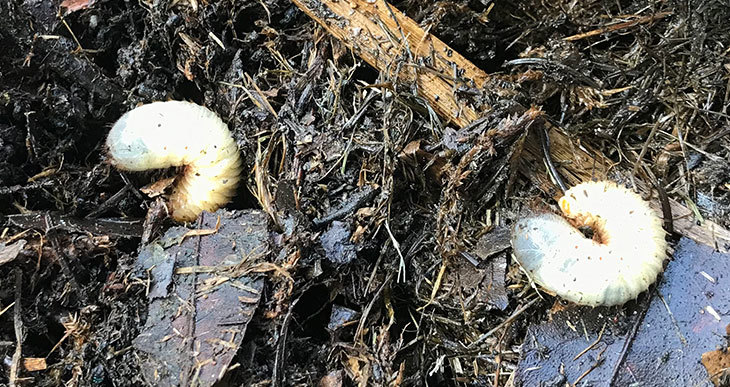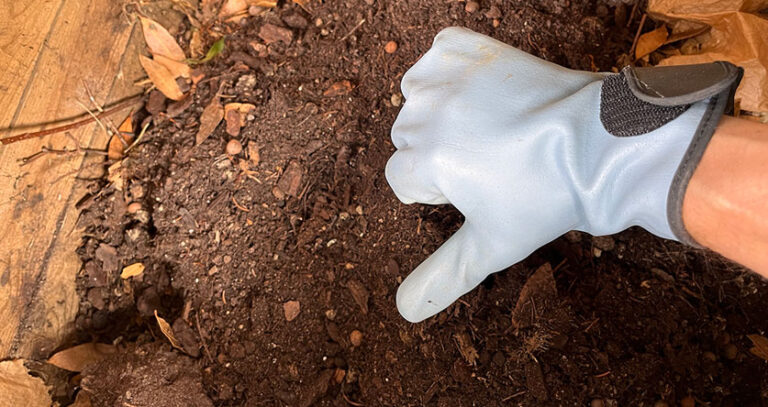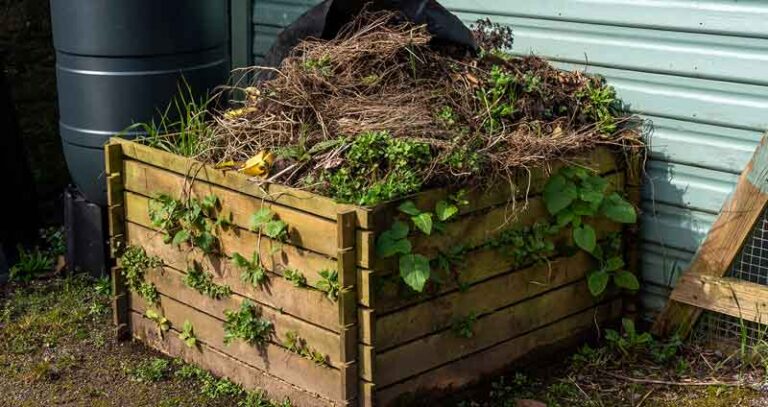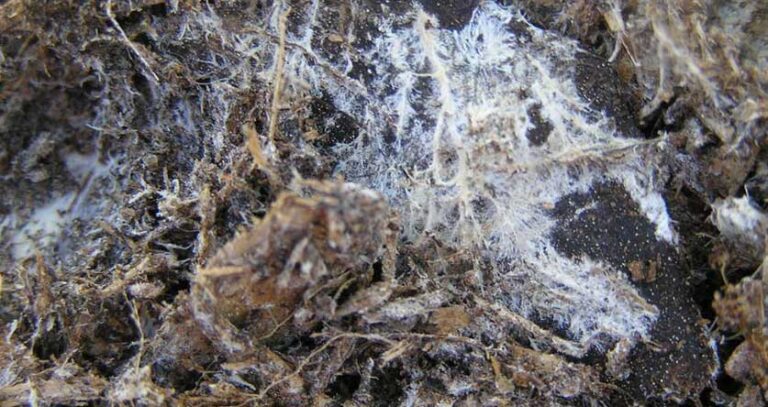Compost Too Wet (Soggy Solutions!)
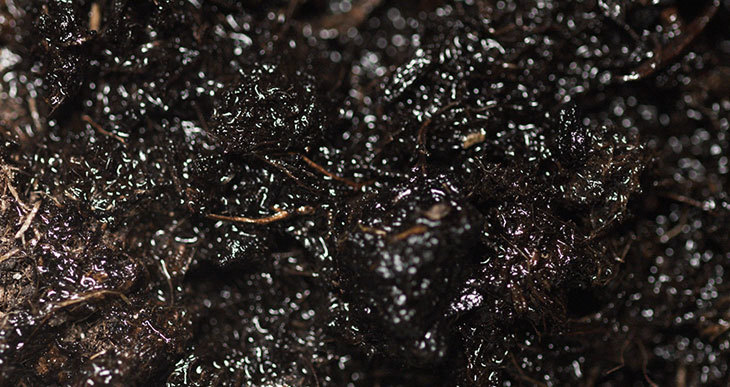
Let’s face it.
It’s soggy, and it smells weird!
The moisture level in your compost is one of the four critical components you need to monitor.
Otherwise, things can get lopsided pretty quickly.
So what do you do if your compost is too wet, and how do you figure out the proper moisture levels?
Keep reading to find out everything you need to know to fix your waterlogged compost.
How do I know if my compost is too wet?
A few clear signs will indicate that your compost is too wet. The texture and the smell of waterlogged compost are usually the first things to tip you off.
If your compost is too wet, it will have a soggy feel. In the worst case, it will also give off an unpleasant sweet sticky smell like ammonia.
The consequences of having too much moisture in your compost are that the composting process will be interrupted, slow down, or completely stop! In addition, too much water will prevent air from circulating and make it difficult for the microorganisms to do their job.
The lack of oxygen will also cause your compost to smell bad because it has turned anaerobic (rotting that happens without oxygen).
If you notice any of the following, it’s time to take action:
- The compost isn’t decomposing
- Compost smells bad
- Compost is attracting flies
- The compost is not heating up
- Compost looks and feels soggy
The microbes that are responsible for composting need water to survive. To digest the compost’s organic waste, they need to be coated in a thin layer of moisture. They secret enzymes into this film of water which breaks down organic matter and allows them to absorb nutrients. Without moisture, they’re unable to do their job!
You need to aim for a water content that is somewhere between wet and dry:
- Just right: Compost should feel moist. You should start to see materials changing color from light to dark as they begin decomposition.
- Too wet: Compost will feel soggy, and it might also smell.
- Too dry: Compost will feel dry and crumbly. If the materials don’t change appearance after several days, they are not moist enough.
You can check the moisture level by doing the squeeze test. Pick up a handful of compost and squeeze it.
If water drips out, it’s too wet. If no water comes out, it’s too dry.
Should compost be wet?
Yes, compost needs to be wet, but not soaking wet. Instead, compost should be as damp as a wrung-out sponge.
If it’s too dry, the process will slow down, and if it’s too wet, the process will stop altogether.
So how wet should my compost be?
The ideal moisture content for compost is between 40 to 60%.
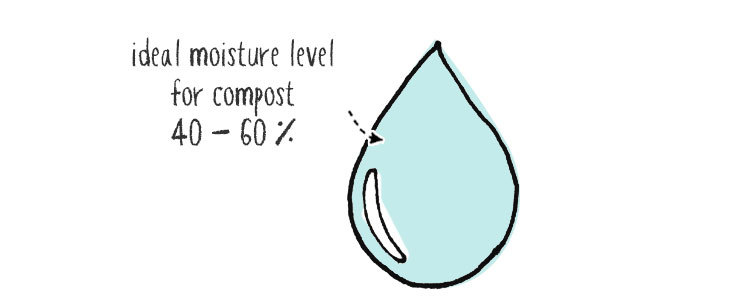
This is how wet your compost should be most of the time. Measuring this is obviously a bit tricky, which is why the squeeze test is such a helpful tool.
You can also use a special compost moisture meter like this one (Amazon) to keep track of your precious compost’s water content!
Why is my compost too wet?
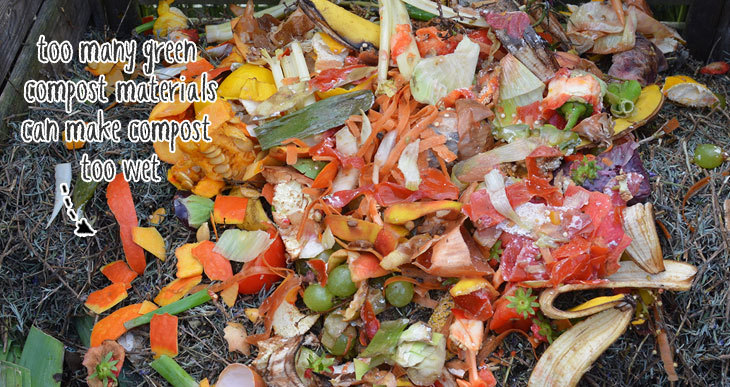
One of the most common reasons compost gets too wet is adding too many green compost materials. Nitrogen-rich organic waste like grass clippings or vegetable scraps are very wet to begin with.
They break down quickly and tend to collapse and compact as they start to rot.
As a result, the air stops circulating, which prevents evaporation. The moisture level increases (especially in a closed container like a bin or tumbler). Anaerobic decomposition begins, and the excess moisture drains to the bottom of the pile and starts to smell.
The proper balance of materials is probably the first fundamental thing to consider when compost conditions look too wet. When in doubt, it’s always better to err on the side of caution and add less green materials rather than more.
There are a few other reasons your compost might be too wet:
- You’re adding more water than necessary
- There’s not enough air circulation
- You’re using the wrong ratio of materials (too many greens)
- If using a bin or tumbler, it lacks ventilation
- insufficient drainage
- too much exposure to rain
In the early stages, excessively wet compost can go unnoticed. But after a while, it will begin emitting foul odors…
If compost is too wet and smells
If the compost smells bad, this means you’ve crossed the boundary from aerobic to anaerobic decomposition.
This isn’t good for several reasons:
- The process will be slower
- It will produce methane gas which is a greenhouse gas
- The compost will smell terrible
Also, an anaerobic compost pile produces useless ammonia-type substances, which in some cases are harmful to plants. The unpleasant smell comes from gases such as hydrogen sulfide, which smells like rotten eggs!
Not the kind of thing you want going on in your compost!
If your compost is waterlogged and smells bad, don’t despair! There are a few things you can do to fix it.
What to do if compost is too wet
When you notice that compost is too wet, start by establishing the root cause. It could be a problem with the components you’re adding. For example, too many green materials or over-watering. Otherwise, there could be an underlying problem with your composting system.
Is it getting enough ventilation if you’re using a closed system like a bin or tumbler? Some containers are so air-tight they don’t let in enough airflow. If this is the case, you might need to drill some holes in the sides or bottom.
Another thing to consider is drainage. Compost needs to drain any excess water that leaches from the composting matter. If it can’t do this, it will become waterlogged.
If you have an open pile, perhaps you could build a simple wooden frame or use an old pallet to elevate it off the ground. This will allow any water to drain away and improve air circulation.
Or maybe the heap is exposed to too much rainfall? Cover it with a tarp or something else to protect it from the elements.
If you’re sure the problem is with too much moisture, the next step is to add some dry materials like autumn leaves, straw, wood chips, or shredded paper.
How to fix wet compost (drying out compost )
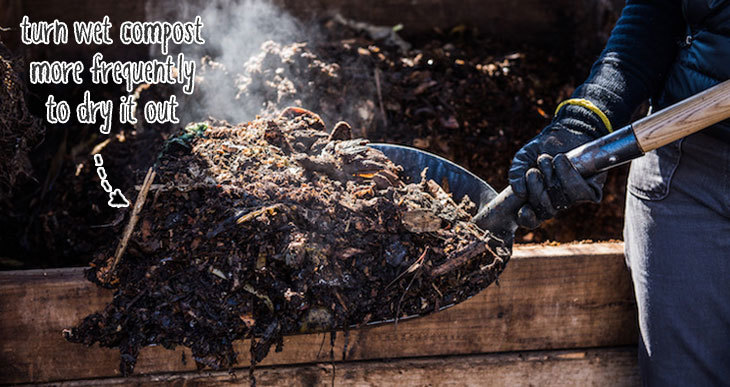
There are a few things you can do to fix waterlogged compost:
- Add dry ingredients: If your compost is too wet, you should first add some dry carbon ingredients. This will help absorb some of the excess moisture. The added browns will balance the surplus greens.
- Try spreading the wet compost out on a tarp and let it dry (assuming it isn’t raining, of course).
- Turn more frequently: Compost needs to be turned regularly to aerate it and promote evaporation. If you notice your compost is too wet, make sure to turn it more frequently until the moisture content returns to normal levels.
- Improve drainage: You can improve drainage by adding a layer of twigs and branches at the bottom of a compost heap or bin.
Can slimy compost be saved?
In most situations, yes!
Slimy compost is usually the result of anaerobic decomposition. This happens when there isn’t enough oxygen present. The good news is, it can be fixed by adding more dry ingredients and turning the pile more frequently to aerate it.
However, if it starts to smell REALLY bad, you may have to make do with some damage control measures.
For example, this can be the case with piles of fermented grass clippings. The bad-smelling organic acids can linger for quite a long time. Instead, try covering the anaerobic compost with spadefuls of soil, mature compost, and may some shredded leaves. This will act as a sort of bio-filter to neutralize the bad odors and introduce some valuable microbes to the mix.
Conclusion: Soggy compost
Soggy compost is icky, but it doesn’t mean the end of your composting journey! With a little bit of effort, you can get things back on track. Be sure to add some dry ingredients, turn more frequently, and improve drainage if you notice your compost is too wet. In most cases, slimy compost can be saved too!


